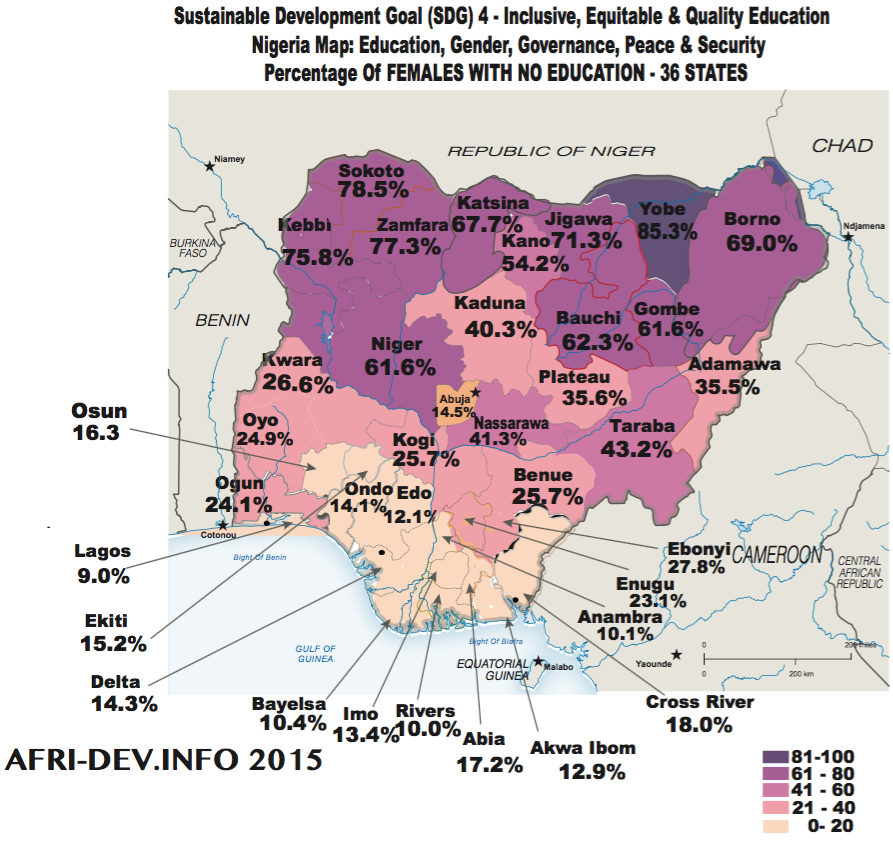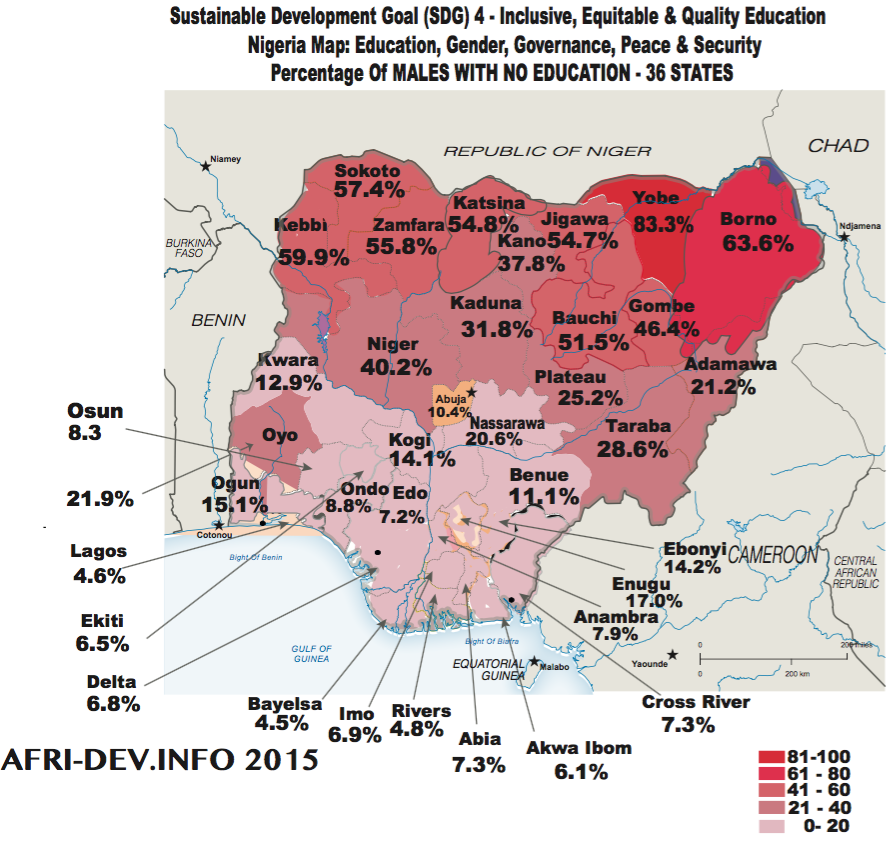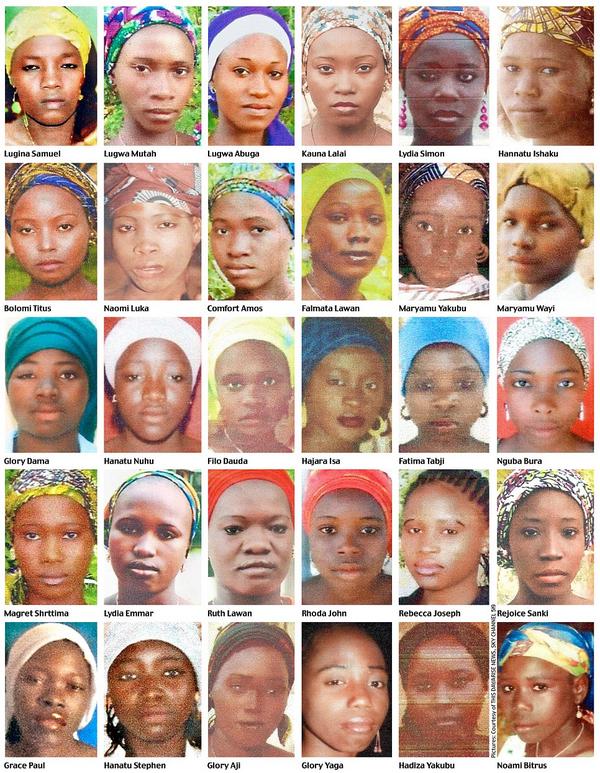


Join Us For More Info On Twitter- @AfriDevInfo
SDGs, Education, Gender, Conflict/Extremism & Development –
Nigeria Female & Male Education Scorecards (Day of Girl Child 2015)
#DayOfTheGirl
To commemorate the first Day of Girl Child of the Post 2015 SDG era, Africa Health, Human & Social Development Information Service (Afri-Dev.Info) and partners have issued female and male gender comparison education scorecards covering 36 states of Nigeria, and Abuja the Federal Capital Territory.
The scorecards focus on:
- New Sustainable Development Goal 4 on Education; Goal 5 on Gender Equality; & Goal 10 on Reducing Inequality Within & Among Countries (#GenderGap In Education)
- Multisectoral links between the above SDGs including: clear majority of males not having access to education in most of Northern Nigeria, Boko Haram extremism in North East Nigeria, conflict, hostility to education (especially female education) violence against women & girls including widespread abductions and forced / child ‘marriage’.
- Educational aspects of the proposed plan by the National Assembly for reconstruction of North East Nigeria ravaged by BokoHaram extremist conflict.
The recommendations:
- Call for a joint public panel of the soon to be inaugurated Senate and House of Representatives Committees – on Gender, Education and Employment to look into the circumstances behind:
- The massive failure of governments / education systems of especially 11 worst performing states to provide education for the great majority of women and girls.
- The implications of having a majority of millions of uneducated, unemployable men and boys, potentially indoctrinated to be hostile to female education – & implications for violence against women and girls both in the community; and for women and girls in school.
- Faults the Nigerian Northern Governors Forum recent claim in outcomes of meeting of October 2015 – that the spread and growth of extremism and violence is linked to an inadequate criminal justice system – inherited from colonialists. A claim which ignores the role of poor governance and under-investment in human development.
- Underlines that reconstruction of North East Nigeria especially must focus on human development, education, vocational training, gender equality and security.
- Underlines the importance of having dedicated budget lines for the education, vocational training, human development and security of 2.1 million IDPs (equivalent to population of Qatar or Namibia) – especially vulnerable women and girls.
*Highlights of scorecards, findings, recommendations and statement are below the scorecard info-graphic data maps


Highlights Of The Female & Male Education Scorecards Are As Follows:
For Women & Girls
11 state governments mostly from the North East and North West zones have failed woefully to meet the MDGs on education, and failed to provide any education for a clear majority of between 54% and 85% of women and girls in their states.
The states are: Yobe 85.3%; Sokoto 78.5%; Zamfara 77.3%; Kebbi 75.8%; Jigawa 71.3%;
Borno 69.0%; Katsina 67.7%; Bauchi 62.3%; Gombe 61.6%; Niger 61.6%; Kano 54.2%.
Another 12 state governments have failed to provide any education for between 20% and 50% of women and girls in their states.
The states are: Taraba 43.2%; Nasarawa 41.3%; Kaduna 40.3%; Plateau 35.6%; Adamawa 35.5%; Ebonyi 27.8%; Kwara 26.6%; Benue 25.7%; Kogi 25.7%; Oyo 24.9%; Ogun 24.1%; Enugu 23.1%.
Failure to provide education on this scale violates the right to education of tens of millions of women and girls, threatens to entrench poverty and gender inequality as a permanent state of affairs, and has a devastating negative impact on health and human development of women and girls.
For Men & Boys
8 state governments all from the North East and North West have failed woefully to meet the MDGs and provide any education for a clear majority of between 51% and 83% of men and boys in their states.
The states are: Yobe 83.3%; Borno 63.6%; Kebbi 59.9%; Sokoto 57.4%; Zamfara 55.8%;
Katsina 54.8%; Jigawa 54.7%; Bauchi 51.5%.
Failure to provide education on a mass scale violates the right to education of tens of millions of men and boys.
Significantly, lack of education, job skills and mass unemployment of boys and men has been cruelly exploited by Boko Haram extremism – especially in the North East, which has in turn led to destabilisation of Nigeria, neighbouring countries of the Lake Chad Basin and ECOWAS – and an escalation of gender based violence, against especially women and girls in school.
Another 9 state governments have failed to provide any education for between 20% and 50% of men and boys in their states.
The states are: Gombe 46.4%; Niger 40.2%; Kano 37.8%; Kaduna 31.8%; Taraba 28.6%; Plateau 25.2%; Oyo 21.9%; Adamawa 21.2%; Nasarawa 20.6%
Highlights Of Conclusions & Recommendations From The Scorecard Are As Follows:
1. A comparison of female and male education across all states demonstrates – that female education is worse off by at least between 2% and 21% across Nigeria – but especially in the 11 worst performing states.
Lack of access to education impacts negatively on rights, health and human development of women and girls – including condemning them to life long poverty, and making it more likely that they will suffer life long abuse and exploitation through child ‘marriage’
2. The ongoing conflict in North East Nigeria and a huge Internally Displaced Population of 2.1 million (equivalent to population of Qatar or Botswana) – threatens to ensure even worse educational outcomes for the immediate future – unless dedicated investment is made through 2015 supplementary budgets, and 2016 Budgets of federal government and relevant state governments.
Education and vocational skills are crucial for female IDPs, to be able to earn an income without which they are open to abuse and exploitation by both officials, and men in host communities.
For IDP men and boys education and vocational skills are crucial to prevent them from being drawn into extremism and criminal activity.
3. Afri-Dev calls for a joint public panel of the soon to be inaugurated Senate and House of Representatives Committees on Gender, Education and Employment to look into the circumstances behind:
- The massive failure of governments and education systems of especially 11 worst performing states to provide education for the great majority of women and girls.
- The sociological implications for violence against women and girls in the community; and for women and girls in school – of having millions of men uneducated and unemployable potentially indoctrinated to be hostile to female education.
4. Afri-Dev calls on the Northern Governors Forum especially to prioritize investment in education and human development as the long term solution to conflict – rather than the flawed claims from last weeks meeting of the Forum that an inadequate criminal justice system and penal code inherited from colonialists is a major cause of extremism and violence in the North East.
Contrary to claims of the Forum – The spread and growth of Boko Haram extremism in North East Nigeria, the devastation of the region, and violence against women and girls has not been caused by lack of stiff punishment – but rather by poor governance, poor investment in human development, education and skills – which has resulted in the clear majority of both men and women of North East Nigeria having no education whatsoever – and exploited by extremism.
Speaking to the scorecards, findings & recommendations – Rotimi Sankore Editor in Chief of Afri-Dev.Info stated:
“The sustainable reconstruction of North East Nigeria especially must focus on human development, education, vocational training, gender equality and security”
“The bizarre conclusion by last weeks Northern Governors Forum that extremism, conflict, and violence against women across the North East is as a result of ineffective criminal justice system and penal code inherited from colonialists is a diversion from lack of investment in human development over the previous 30 years or more.”
Rather than set up a committee of 19 Attorney Generals to review the penal code, The Forum should have set up a committee of Commissioners of Education, Gender, Youth and Employment to address devastating education and skills gaps in especially the North East and North West.
It is scandalous that only one state out of 19 Northern States (Kaduna, which is not even the worst performing state) has found it necessary to declare an education emergency.
“If by end of new Post 2015 Sustainable Development Goals in 2030 lack of education is not reduced to well under 20% in all Northern states – The present crop of Northern governors risk presiding over the destruction of the future of the youth of Northern Nigeria, an increase in extremism, and even worse violence against women and girls.
The investment must start from the 2016 budgets for thousands of new schools and tens of thousands of new teachers for quality education and vocational skills.
It is not possible to have lack of education and illiteracy on such a massive scale and expect any sustainable peace, development and prosperity
For men and boys, education and vocational training will reduce possibility of being drawn in by extremism to wreck violence on communities and especially on women and girls in school.
For women and girls, education and skills will not only reduce poverty, but also improve health outcomes for them and their children, and promote gender equality which is not only a human right, but a pre condition for sustainable development.
The militarisation of the North East can only provide peace in the short term.
Even without extremist exploitation of lack of education, misery and poverty – the existing wide spread illiteracy makes effective governance impossible, and entrenches a permanent state of underdevelopment, which dramatically raises the possibility of failed states across North East, and North West Nigeria.”
Sankore underlined that:
“If they have not realised, the Northern governors are on notice that henceforth what happens in North East and North West Nigeria is now the business of the whole world.
As Africa’s most populous country and biggest economy, the future of Africa is tied to the future of Nigeria.
The conflict in the North East alone almost collapsed Nigeria and has spread beyond Nigeria’s borders to countries of the ECOWAS sub region.”
Data, Scorecard & Infographics on Female Education – Produced With Kind Support Of UAF-Africa
Join us on Twitter @AfriDevInfo
- Media: For further information please contact Email: media[at]afri-dev.net
- To find out more about publications please contact email: publications[at]afri-dev.info
- For partnerships, support or general information please contact email : contactus[at]afri-dev.info





